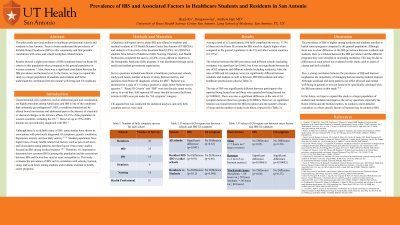Tuesday Poster Session
Category: Functional Bowel Disease
P4053 - Prevalence of IBS and Associated Factors in Healthcare Students and Residents in San Antonio
Tuesday, October 29, 2024
10:30 AM - 4:00 PM ET
Location: Exhibit Hall E

Has Audio
- DG
Dongwoo Gu
University of Texas Health San Antonio
San Antonio, TX
Presenting Author(s)
Heyji Ro, , Dongwoo Gu, , Andrew Han, MD
University of Texas Health San Antonio, San Antonio, TX
Introduction: Irritable Bowel Syndrome (IBS) is a syndrome characterized by altered bowel movements and abdominal pain in the absence of structural or chemical changes in the gastrointestinal (GI) tract and affects 10-15% of the population in western countries, including the US. IBS has no definite cause, but some studies have shown its correlations with stress, psychological/psychiatric issues, infections, and genetic conditions. However, there haven't been many studies on IBS among trainees in the healthcare field, despite student populations having higher rates of many health-related risk factors, such as perceived stress and inconsistent eating patterns. This study evaluates the prevalence of self-reported IBS and its correlation with schools, burnout, sleep, and work hours among students in professional healthcare schools and residents.
Methods: This study was conducted at UT Health Science Center San Antonio and University of the Incarnate Word. A survey about IBS was distributed to both schools through social media and student government organization. A total of 106 medical residents and students from School of Medicine (MD and DO), Nursing, Dentistry, and Health Professions fully completed the survey. They self-reported their schools, work hours, sleep pattern, and burnout metrics (single factor burnout survey question) and answered questions in the ROME IV diagnostic criteria for IBS. Chi-squared test was conducted for statistical analysis.
Results: 106 participants completed the survey. Among them, 17.9% met the ROME IV criteria for IBS which is slightly greater than the IBS prevalence in the general population in western countries3. The relation between the rate of IBS and different schools (including residents) was significant (p=0.041), although there was no significant difference between residents and students (p=0.12). Also, the IBS prevalence was significantly different between participants who reported being burned out (burnout score ≥ 4) and those who reported not being burned out (p=0.00063). In contrast, the number of hours of sleep (p=0.85) and the number of work hours (p=0.60) didn’t have a significant relation with the IBS prevalence.
Discussion: The prevalence of IBS is not higher among residents and students enrolled in health career programs compared to the general population. However, there is a strong correlation between burnout and the prevalence of IBS which shows the importance of management of burnout among medical trainees.
Disclosures:
Heyji Ro, , Dongwoo Gu, , Andrew Han, MD. P4053 - Prevalence of IBS and Associated Factors in Healthcare Students and Residents in San Antonio, ACG 2024 Annual Scientific Meeting Abstracts. Philadelphia, PA: American College of Gastroenterology.
University of Texas Health San Antonio, San Antonio, TX
Introduction: Irritable Bowel Syndrome (IBS) is a syndrome characterized by altered bowel movements and abdominal pain in the absence of structural or chemical changes in the gastrointestinal (GI) tract and affects 10-15% of the population in western countries, including the US. IBS has no definite cause, but some studies have shown its correlations with stress, psychological/psychiatric issues, infections, and genetic conditions. However, there haven't been many studies on IBS among trainees in the healthcare field, despite student populations having higher rates of many health-related risk factors, such as perceived stress and inconsistent eating patterns. This study evaluates the prevalence of self-reported IBS and its correlation with schools, burnout, sleep, and work hours among students in professional healthcare schools and residents.
Methods: This study was conducted at UT Health Science Center San Antonio and University of the Incarnate Word. A survey about IBS was distributed to both schools through social media and student government organization. A total of 106 medical residents and students from School of Medicine (MD and DO), Nursing, Dentistry, and Health Professions fully completed the survey. They self-reported their schools, work hours, sleep pattern, and burnout metrics (single factor burnout survey question) and answered questions in the ROME IV diagnostic criteria for IBS. Chi-squared test was conducted for statistical analysis.
Results: 106 participants completed the survey. Among them, 17.9% met the ROME IV criteria for IBS which is slightly greater than the IBS prevalence in the general population in western countries3. The relation between the rate of IBS and different schools (including residents) was significant (p=0.041), although there was no significant difference between residents and students (p=0.12). Also, the IBS prevalence was significantly different between participants who reported being burned out (burnout score ≥ 4) and those who reported not being burned out (p=0.00063). In contrast, the number of hours of sleep (p=0.85) and the number of work hours (p=0.60) didn’t have a significant relation with the IBS prevalence.
Discussion: The prevalence of IBS is not higher among residents and students enrolled in health career programs compared to the general population. However, there is a strong correlation between burnout and the prevalence of IBS which shows the importance of management of burnout among medical trainees.
Disclosures:
Heyji Ro indicated no relevant financial relationships.
Dongwoo Gu indicated no relevant financial relationships.
Andrew Han indicated no relevant financial relationships.
Heyji Ro, , Dongwoo Gu, , Andrew Han, MD. P4053 - Prevalence of IBS and Associated Factors in Healthcare Students and Residents in San Antonio, ACG 2024 Annual Scientific Meeting Abstracts. Philadelphia, PA: American College of Gastroenterology.
